
7 Creative Ways of Using Digital Marketing CRM
 Updated on
Updated on
 By Katie Bowman
By Katie Bowman
Katie Bowman
Katie has extensive experience in customer service and enjoys the opportunity to help others. She is committed to providing high-quality service and d...
learn more
Katie Bowman
Katie has extensive experience in customer service and enjoys the opportunity to help others. She is committed to providing high-quality service and d...
Table of Contents
Table of Contents
A CRM isn't just a sales tool that helps you organize leads, schedule calls, and automate reminders.
Your CRM can take your online marketing to the next level and can be the backbone of your most successful campaigns.
By utilizing digital CRM text automation, purchase data, customer analytics, and much more, you can prioritize, optimize, and personalize your digital marketing strategy.
We know. Thank you.
Though we can't guarantee you'll pick up our gift with words, we intend to give you an all-in-one handbook to buff your CRM digital marketing skills to a shine.
Interested? Grab a coffee and read on.
What is a Digital Marketing CRM?
A digital marketing CRM is an effective sales tool that helps businesses manage and nurture relationships with their customers throughout their digital journey. It goes beyond the traditional CRM focus on sales and customer service, extending its reach to encompass all the touchpoints where customers interact with your brand online.
Think of it as your digital marketing headquarters, where you can:
- Unify customer data: From website visits and email clicks to social media interactions and purchase history, a digital marketing CRM consolidates all customer data into a single, centralized platform.
- Segment and target your audience: With a clear understanding of your customers, you can segment them into groups based on shared characteristics and interests.
- Personalize the customer experience: Leverage the rich customer data in your CRM to personalize your interactions at every stage. From website recommendations to email content and social media outreach, tailor your communication to each individual's needs and preferences.
- Automate marketing tasks: Streamline your marketing efforts by automating repetitive tasks like email blasts, social media scheduling, and lead nurturing campaigns.
- Track and measure results: A digital marketing CRM provides valuable insights into the performance of your marketing campaigns.
The Importance of Having a Digital CRM Strategy

Imagine juggling a thousand customers, each with their own preferences, pain points, and purchase history, all while trying to plan your next marketing campaign. Sounds chaotic, right? That's where a digital marketing CRM system comes in to help you enhance your customer relationships.
Let's dive deeper into the key benefits:
Allows You to Gain a Better Understanding of Your Customers Through Data
Gone are the days of guessing what makes your customers tick. A digital CRM acts like a treasure trove, collecting and organizing every interaction, purchase, and website visit. It's like having a personal shopper for each customer, whispering their secret desires and buying habits right into your ear.
This data goldmine lets you tailor your marketing campaigns, product recommendations, and customer service with laser precision. Imagine sending birthday emails with their favorite items instead of generic greetings – talk about brownie points!
Allows You to Organize Existing Customers and Leads
Remember that feeling of losing track of a promising lead in the email abyss? A digital CRM is like a wrangled for your customer interactions. It keeps your prospects and existing customers neatly organized, with notes, emails, and follow-up tasks all in one place. No more sticky notes stuck to your monitor or frantic scrambles through endless spreadsheets. It's like having a dedicated assistant who remembers everything (even that embarrassing joke you made on the first call).
Automations Save Time on Tedious and Repetitive Tasks
Let's face it, some marketing tasks feel like running on a hamster wheel – repetitive, time-consuming, and frankly, soul-sucking. But guess what? Your digital CRM can be your personal escape pod!
From scheduling social media posts to sending automated welcome emails, it takes over the mundane, freeing you to focus on the real magic – crafting killer content, brainstorming innovative campaigns, and building genuine relationships with your customers.
Keeps Customer, Sales, and Marketing Data in One Place
Ever felt like your marketing, sales, and customer service teams are speaking different languages? A digital CRM brings everyone together under one roof, storing all customer data in a single, accessible platform.
This creates a 360-degree view of the customer, allowing each team to tailor their approach based on the latest insights and interactions. Imagine a seamless customer journey where sales pick up where marketing left off, and customer service resolves issues with a personalized touch.
That's the power of a digital marketing CRM!
7 Ways CRM Can Contribute to Your Digital Marketing Efforts
Customers are the heart of CRM (it's right there in the acronym!) and customers are also the heart of marketing.
It goes to figure that CRM software would contain a multitude of features to make online marketing easier and more effective.
Features like…
1. Automation
Automation is a broad topic. Especially with a CRM. Everything can be automated to ease processes, streamline communication, and take hours of tedium off your plate.
CRM automation can benefit your marketing with:
- Text and email drip campaigns
- Customer service and communication
- Prospect nurturing
- Scheduling demos
- Lead routing
Not to mention the little things…if meeting reminders, workflow, and reporting are automated your business can focus on your campaign and your customers.
If you want a deeper look, check out this blog on why task automation can really be a lifesaver.
2. Analytics

Possibly one of the most important tools at your disposal. Analytics will tell you what your customers are spending on, what they aren't spending on, and who they are.
Knowing your customer is knowing their pain points, wants, and needs.
Here's a little table on analytic data and how it benefits your company:
|
Data collected |
What it tells you |
|
Pages viewed, contact forms touched |
Customer interest |
|
Purchases made |
Personal customer preferences, popular products, and services, successful campaigns |
|
Age, gender, location |
Target demographic |
|
Texts opened |
Engaging, successful campaign |
|
Texts unopened |
Unengaging campaign |
|
Time texts are opened |
Optimal send time |
So you'll be able to make the perfect CRM digital marketing campaign by digesting all this info and putting it to work.
You'll know that your last campaign flopped because it was launched at 9 AM with an emphasis on dress shoes…when all your customers engage at noon and love running shoes.
3. Automatic Contact Creation
Most CRMs can capture customer data from online forms and automatically create and update contact profiles. This takes away the chore of your team having to manually create and edit contact information.
This not only ensures that no prospect slips by but also encourages your salespeople to respond faster to prospects and increase conversion rates. The process might look like this:
- New contact made automatically by the system
- Sales rep sees notification of new contact
- Responds to request in real-time
- The response is personalized and prompt
- Prospect is pleased
When a process is automated and served upright to you, it's much easier to justify the time and effort to go get ‘er done.
And every customer likes prompt service.
4. Logged Customer Service and Phone Tracking

Another way to measure campaign success is through logged calls. It's basically another form of analytics.
Being able to attribute calls to different marketing initiatives boosts your ROI by comparing which campaigns are the most successful. Are your calls coming in through PPC campaigns? Social media advertising? Organic search visitors?
Phone tracking also helps monitor the quality of your customer service.
And improved campaign effectiveness and customer service both lead to a boost in conversion rates.
We go on and on about why you should track phone calls in this blog…seriously, we could talk about it all day.
5. Lead Management
Ah, one of CRM software's most popular tools. Its most featured feature if you will.
The importance of lead management can never be overstated, but it's outstanding in CRM digital marketing for:
- Scoring and qualifying leads
- Nurturing leads as they progress through your sales funnel
- Retaining previous customer relationships
- Updating customer files
This can lead to a one-to-one virtual connection with a prospect, approaching them with a personal digital campaign. You can use their preferences to reach out via social media or email with a product or service that appeals to them.
You know, like: “If you enjoyed Sexy Lace Panties then you might enjoy…”
*ahem*
Anyway - check out this blog post to find out how a lead information system can help you crush your sales goals.
6. Tracking Company Performance and Goals
![]()
Tracking your company's performance metrics and monitoring goals are top priorities when it comes to marketing and sales. Marketing companies lose approximately 550 hours and $32,000 per sales rep from using bad tracking data.
Do you even know how much that is?
That's 32,000 cheap hamburgers.
In all seriousness, tracking your company's business performance metrics will help you monitor your pipeline, sales performance, sales cycle, percentage of marketing-oriented customers, and a whole lot more. These metrics measure your company's performance and your campaign's progress, ensuring they align with your goals.
7. Reminders and Notifications Squash Missed Opportunities
You know that little “ding” from your phone that helps remind you to buy eggs on the way home? It can help your CRM digital marketing and boost your ROI.
Don't believe us?
Missed opportunities are one of the biggest errors a company can make and reminders and notifications totally destroy missed opportunities.
Here are a few ways reminders help you out:
- Did you contact the customer who inquired via email?
- Did you follow up on the lead from last month?
- Did you follow up on the lead from last July who said they'd be ready to talk in a few months?
That last one is absolutely critical. Without reminders, would you ever remember something that long ago when you're so damn busy? And 95% of converted leads are reached on the sixth attempt.
Your mother ever tells you no one likes a quitter? Mama was right.
5 Creative Ways of Using Ringy's Digital Marketing CRM
You've got an idea of how a digital CRM strategy can be implemented into your marketing, but let's go a little more in-depth. Let's give you a couple of creative ways to put this digital marketing CRM into effect.
1. Automated Email and SMS Drip Campaigns
Forget blasting everyone with the same generic message. Ringy's drip campaigns let you nurture leads like a pro. Imagine this: a potential customer browses your website, downloads an ebook, and boom!
They're automatically enrolled in a personalized email or SMS sequence that educates, engages, and gently guides them toward a purchase. You can segment your audience based on interests, behaviors, and purchase history, ensuring every message resonates. And the best part, SMS campaigns have a high open-rate, up to 90%.
Ringy even lets you schedule emails and texts in advance, so you can focus on crafting compelling content, not manual tasks.
2. Create Personalized Messaging
Robots sending robotic messages? Not with Ringy's dynamic personalization tools.
Ringy's CRM lets you infuse your communications with a touch of human magic. Automatically insert a customer's name in emails or text messages, making them feel valued and individually recognized. Segmentation features take personalization a step further, allowing you to tailor messages to specific customer groups based on demographics, interests, or purchase behavior.
Did you know that 84% of consumers are more likely to purchase from a company that offers a personalized experience? That's the power of personalization.
Imagine sending targeted promotions to recent website visitors or offering special discounts to your most loyal customers. Ringy's CRM helps you speak directly to each customer, not just a generic audience.
3. Use AI to Create Rock-Solid Messages and Pitches
Struggling to find the right words? Ringy's got your back with the power of AI. Our new AI Scripting Tool analyzes your customer data and suggests winning message templates and talking points, tailored to each individual lead. No more writer's block, just confident, persuasive pitches that convert like crazy.
Imagine saying the right words at the right time, effortlessly, every single interaction. Talk about confidence-boosting superpowers! So ditch the generic scripts and let AI help you speak the language of your customers.
4. Use Tags to Categorize and Organize Leads
Keeping track of leads can feel like herding cats, but Ringy's tagging system makes it a walk in the park. Attach custom tags to leads based on any criteria you choose, like industry, purchase intent ("Hot" or "Cold"), or even specific interests. This way, you can segment your audience for targeted campaigns, prioritize follow-ups, and gain valuable insights into your customer base. Think of it as color-coding your leads for effortless organization and action.
5. Use Call Recording and Monitoring to Improve Sales Outcomes
Every conversation holds valuable insights, and Ringy's call recording and monitoring features let you tap into this goldmine of data. Analyze call recordings to identify areas for improvement in your sales pitches, track key metrics like call duration and conversion rates, and even coach your sales team based on real-world customer interactions. This closed-loop feedback system empowers you to continuously refine your approach and optimize your sales funnel for maximum impact.
Top 10 Best CRM for Creative Agencies
Okay so, CRM digital marketing will pretty much be impossible without a CRM, so you're probably waiting in anticipation for a comprehensive list of solid CRMs.
Let's get to the juicy part.
|
Digital Marketing CRM Options |
Benefits |
|
Ringy |
Streamline lead generation with omnichannel communication (phone, email, SMS), powerful automation, and insightful analytics. |
|
Drag |
Visually map and manage your client workflow, collaborate seamlessly with your team, and impress clients with professional proposals. |
|
Copper |
Uncluttered interface makes managing client data and interactions a breeze, with built-in email marketing and social media tools. |
|
Thryv |
All-in-one solution for marketing, sales, and client management, perfect for agencies with diverse needs. |
|
Creatio |
Flexible platform allows you to build customized workflows and campaigns, ideal for agencies handling complex projects. |
|
Nimble |
Focus on relationship building with a personal touch, nurture leads effectively with targeted campaigns, and track engagement in real-time. |
|
Keap |
Automate repetitive tasks like email follow-ups and lead scoring, freeing up your time for creative pursuits. |
|
SharpSpring |
Powerful marketing automation features for nurturing leads and personalizing customer journeys, driving higher conversion rates. |
|
Act-On |
Data-driven insights help you optimize campaigns and segment audiences effectively, maximizing your marketing ROI. |
|
HubSpot Marketing Hub |
Comprehensive suite of marketing tools, from email and social media to landing pages and analytics, all under one roof. |
1. Ringy
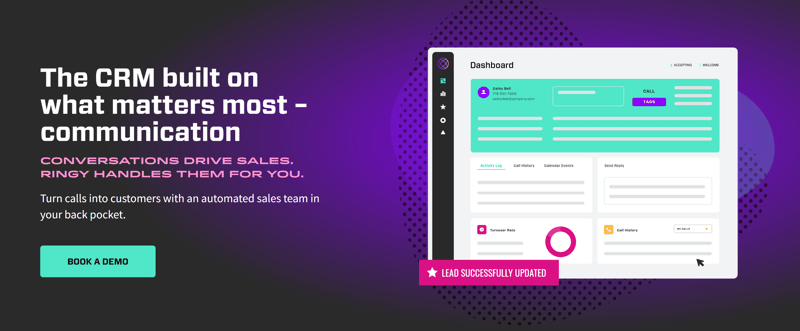
Okay, so, yeah…
*shuffles feet*
Ringy's #1. But there's a damn good reason for that.
Ringy's an all-in-one, VoIP-enabled CRM with killer lead management, easy task automation, highly customizable drip campaigns, and amazing progress-tracking metrics.
And you can do all this performance-scaling, contact-managing, and relationship-building via your mobile, because Ringy has a digital CRM mobile app, too. Not to mention the integration with Zapier, Boomi, and Google Calendar so you can seamlessly go about your work without switching between programs (isn't that a headache?).
It would be worth working with Ringy for the AI-powered insights and reports alone. With one click you can monitor:
- ROI and CPA
- Revenue
- Open rate
- Conversion rates
- Company performance
Plus a whole lot more. And Ringy's is cost-effective at only $119/ month.
You really can't beat that.
*Pricing as of December 2023.
2. Drag
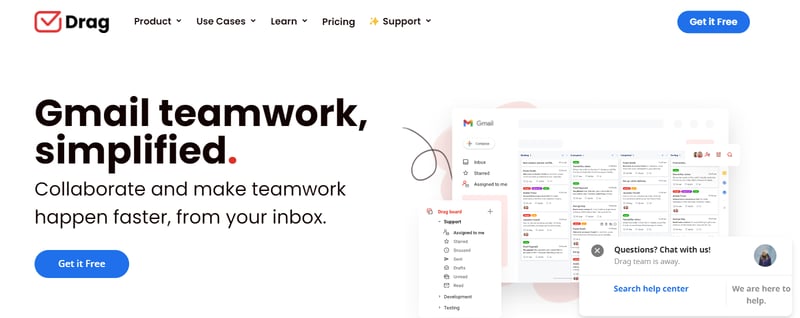
Drag's the first digital workspace done entirely through Gmail. A nice little bonus to be able to manage tasks and support customers through a platform you're most likely already using.
It's free to start but prices go up if you want extra features (that's always how it goes) like Zapier integration or customer support.
Folks mainly like it for being contained within Gmail (its main feature). However, a lot of users say it's pretty tricky to get the hang of and that it isn't easy to use on mobile. They have a free version for up to three users, but their starter plan is $10/user/month, billed monthly.
*Pricing as of December 2023.
3. Copper
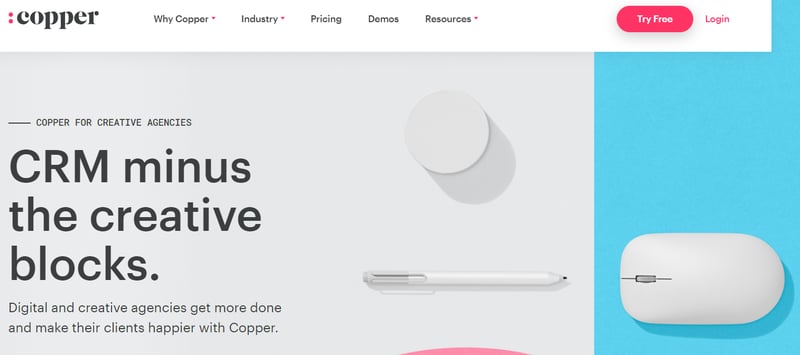
Copper's a CRM for small businesses and agencies with Google Workspace integration and decent workflow automation. Featuring reporting, sales forecasting, and reminders, it's a solid little program.
The most popular pricing option is $69/user/month, but it goes to $$134/user/month if you want drip campaigns, lead scoring, personalized onboarding, and premium customer support.
*Pricing as of December 2023.
4. Thryv
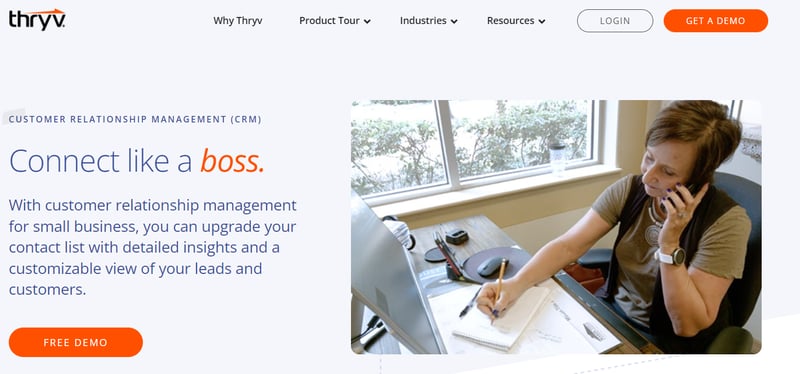
Thryv is a customer-minded CRM made for small businesses with a focus on customer engagement and task automation. Key features include marketing automation, scheduling, and document storage.
As for their pricing plans, Thryv does have a free version limited to five users. But if you want to get the most out of their Command Center, their paid plans start at $20/seat/month.
*Pricing as of December 2023.
5. Creatio
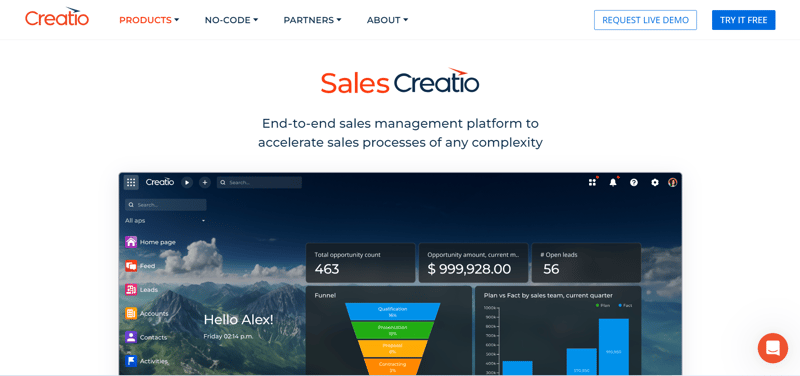
A low-to-no code CRM, Creatio is touted as a process management system for beginners. It offers lead management, opportunity management, and automated marketing with a large degree of freedom.
Its most popular pricing option is $55/user/month, but it has a tier higher that offers “end-to-end processes”. Though they don't disclose the price (or what “end-to-end processes” entails).
People mainly go for it because of being low code/no code so beginners can edit the workflow easily. Though people aren't hot on its integration accessibility and the fact that the “low code” claim doesn't apply to everything.
*Pricing as of December 2023.
6. Nimble
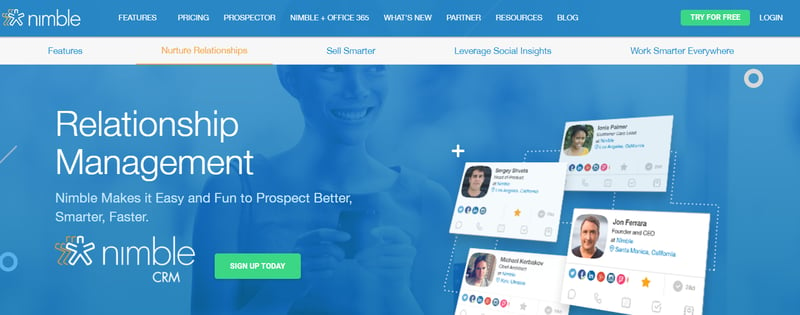
Nimble is a Google Workspace and Office 365 integrated CRM designed to deliver a streamlined experience for users and help teams sell more, faster. Nimble's pretty good for nurturing business prospects across email and has decent calendar integration.
Nimble has just one pricing option at $29.90/user/month. Which is its big drawing point. Customers like the low prices, with other pros being its automatic reminders and social media integration.
Though some users describe its features as being dated and cumbersome. Going so far as to say that Nimble is “stuck in time” and hasn't changed much in ten years.
*Pricing as of December 2023.
7. Keap
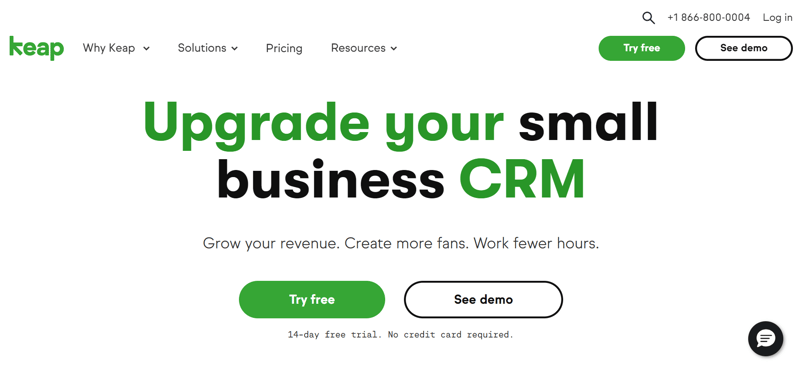
This all-in-one CRM boasts a user-friendly interface and powerful automation features, making it ideal for busy agencies juggling multiple projects and clients. Keap excels at lead nurturing with email marketing tools, landing page builders, and built-in analytics to track campaign performance.
Pricing starts at $199/month for the Pro plan, offering basic CRM features and email marketing. Max and Ultimate plans unlock advanced automation, custom reporting, and integrations, ranging from $289/month to $349/month.
*Pricing as of December 2023.
8. SharpSpring
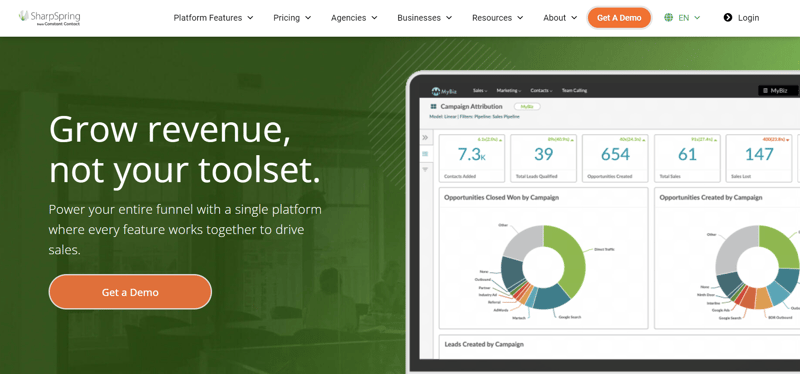
SharpSpring is a marketing automation powerhouse disguised as a CRM. It seamlessly integrates with popular design and project management tools, allowing agencies to streamline workflows and gain deeper client insights. The platform's visual campaign builder and real-time reporting empower data-driven decisions and personalized marketing experiences.
Pricing starts at $12/month for the Lite plan, offering email marketing, social marketing, and third-party integration features. Advanced plans like Standard and Premium cater to larger agencies with complex needs, with pricing determined by customization and usage.
*Pricing as of December 2023.
9. Act-On
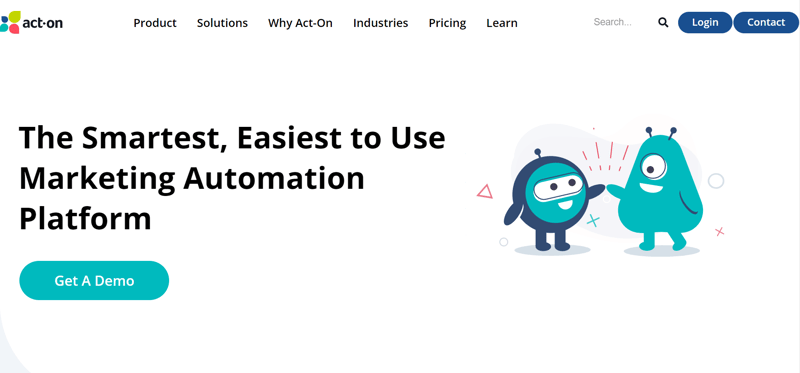
For agencies seeking a CRM built for scaling, Act-On delivers. Its robust platform handles high-volume campaigns and complex workflows with ease. The platform excels at lead scoring, segmentation, and dynamic content personalization, ensuring every client interaction is relevant and impactful.
Act-On offers custom pricing based on individual needs and campaign volume. However, their Professional plan starts at around $$900/month, catering to agencies with larger teams and demanding marketing requirements.
*Pricing as of December 2023.
10. HubSpot Marketing Hub
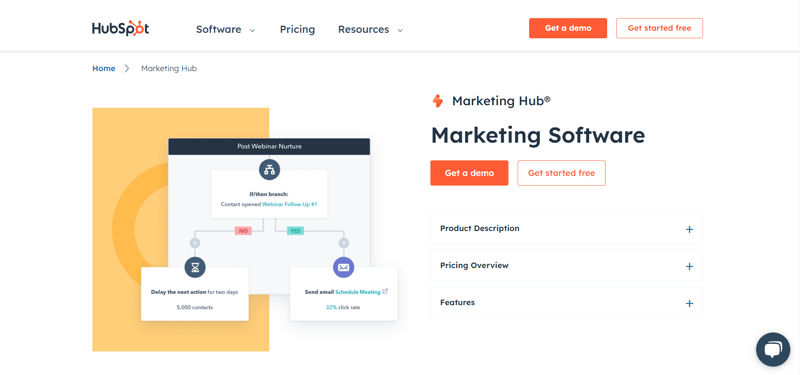
A household name in the marketing world, HubSpot's Marketing Hub offers a comprehensive suite of tools for agencies of all sizes. From lead generation and email marketing to social media management and website analytics, HubSpot provides a centralized platform for managing client campaigns and measuring success.
HubSpot's Marketing Hub Pricing starts at $20/month for the Starter plan, offering basic email marketing and CRM features. Higher tiers like Professional and Enterprise unlock advanced automation, reporting, and integrations, ranging from $890/month to $3,600/month.
*Pricing as of December 2023.
Conclusion
By now you're probably chomping at the bit to get into CRM digital marketing.
You know how digital CRM can give you automation, analytics, company performance metrics, and lead management – and how all those can benefit your online marketing.
|
Digital CRM Features |
Details |
|
Automation |
Drip campaigns via email and VoIP |
|
Analytics |
Measuring customer engagement and purchases made |
|
Company performance metrics |
Conversion rates, revenue, sales by device |
|
Lead management |
Scoring and qualifying prospects, nurturing prospects, retaining old customers |
And that's just a quick recap!
If you want to fully immerse yourself in the benefits, go request a demo with Ringy today so you can start discovering all a CRM can offer your digital marketing.
If your higher-ups say they can't afford a CRM, tell them that with all the money you'll save, all the money you'll make, and the outstanding ROI –
You can't afford not to.

Skyrocket your sales with the CRM that does it all.
Calling? Check. SMS? Check. Automation and AI? Check. Effortlessly keep in touch with your customers and boost your revenue without limits.

Take your sales to new heights with Ringy.
Sales in a slump? Ringy gives you the tools and flexibility you need to capture leads, engage with them, and turn them into customers.
Subscribe to Our Blog
Enter your email to get the latest updates sent straight to your inbox!
Categories
Related Articles




































































































